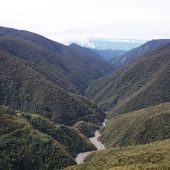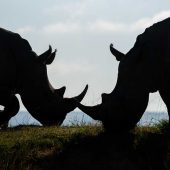Belonging is key to a college degree
 In the social media era, you can look at a university’s Instagram feed and get the impression that every day rates a 10/10 and everyone belongs. But Shannon Brady, a Wake Forest University psychology professor who studies the implications of social belonging, cautions you to look deeper. Smiles on faces and free hoodies emblazoned with…
In the social media era, you can look at a university’s Instagram feed and get the impression that every day rates a 10/10 and everyone belongs. But Shannon Brady, a Wake Forest University psychology professor who studies the implications of social belonging, cautions you to look deeper. Smiles on faces and free hoodies emblazoned with…Categories: Experts, Research & Discovery

 When William Farfan-Rios hikes through the remote forests of the Peruvian Amazon and Andes, he’s doing much more than feeding his appreciation for the natural world. He’s trying to identify the trees that can survive a warming climate—and, ultimately, save one of the world’s largest carbon sinks from collapse. As a biodiversity fellow in forest…
When William Farfan-Rios hikes through the remote forests of the Peruvian Amazon and Andes, he’s doing much more than feeding his appreciation for the natural world. He’s trying to identify the trees that can survive a warming climate—and, ultimately, save one of the world’s largest carbon sinks from collapse. As a biodiversity fellow in forest… You might have seen headlines sounding the alarm about the safety of an emerging technology called agentic AI. That’s where Sarra Alqahtani comes in. An associate professor of computer science at Wake Forest University, she studies the safety of AI agents through the new field of multi-agent reinforcement learning (MARL). Alqahtani received a National Science…
You might have seen headlines sounding the alarm about the safety of an emerging technology called agentic AI. That’s where Sarra Alqahtani comes in. An associate professor of computer science at Wake Forest University, she studies the safety of AI agents through the new field of multi-agent reinforcement learning (MARL). Alqahtani received a National Science… For many, making New Year’s resolutions is a way to chart a path toward new behaviors or away from old ones. Jan. 1 offers the promise of making changes to improve health and happiness. But setting goals and achieving them is hard. “Making a specific plan can actually free up mental energy to accomplish goals,”…
For many, making New Year’s resolutions is a way to chart a path toward new behaviors or away from old ones. Jan. 1 offers the promise of making changes to improve health and happiness. But setting goals and achieving them is hard. “Making a specific plan can actually free up mental energy to accomplish goals,”… Perched on a plastic chair overlooking a colony of Nazca boobies in the Galápagos Islands, researcher David Anderson carefully studied the seabirds. Anderson, a research professor and professor of biology emeritus at Wake Forest University, was shocked to discover that female Nazca boobies had hundreds of conspicuous sexual liaisons with multiple males. And, their promiscuity…
Perched on a plastic chair overlooking a colony of Nazca boobies in the Galápagos Islands, researcher David Anderson carefully studied the seabirds. Anderson, a research professor and professor of biology emeritus at Wake Forest University, was shocked to discover that female Nazca boobies had hundreds of conspicuous sexual liaisons with multiple males. And, their promiscuity… Students are more likely to attain their degree when they report a stronger sense of belonging in their first year of college, according to a new study by Wake Forest University psychology professor Shannon Brady. A one-point increase on a five-point belonging scale corresponded to a 3.4 percentage-point bump in the likelihood that a student…
Students are more likely to attain their degree when they report a stronger sense of belonging in their first year of college, according to a new study by Wake Forest University psychology professor Shannon Brady. A one-point increase on a five-point belonging scale corresponded to a 3.4 percentage-point bump in the likelihood that a student… Jason Fanning has spent a lot of time talking to older adults about leading healthy, active lifestyles. And he knows that the minute he utters the word “exercise,” he loses many of them. Instead, he talks to them about movement across the day, a key component of his current research study, A Mobile Health Intervention…
Jason Fanning has spent a lot of time talking to older adults about leading healthy, active lifestyles. And he knows that the minute he utters the word “exercise,” he loses many of them. Instead, he talks to them about movement across the day, a key component of his current research study, A Mobile Health Intervention… According to the International Rhino Foundation, on average, one rhino is killed by poachers every 15 hours. Despite aggressive anti-poaching measures, the global rhino population has continued to decline. Wake Forest economist Fred Chen’s decades-long research on rhino horn poaching examines the outcomes of defensive anti-trafficking efforts (such as rhino relocation, anti-poaching patrols, GPS trackers,…
According to the International Rhino Foundation, on average, one rhino is killed by poachers every 15 hours. Despite aggressive anti-poaching measures, the global rhino population has continued to decline. Wake Forest economist Fred Chen’s decades-long research on rhino horn poaching examines the outcomes of defensive anti-trafficking efforts (such as rhino relocation, anti-poaching patrols, GPS trackers,… Nearly a decade ago, Kristen Beavers, who studies safe ways for older adults to lose weight, began asking whether weighted vests could help this population drop pounds without sacrificing vital bone mass and lean muscle. Now, in 2025, she routinely gets requests from national media, community groups and individuals interested in better ways to work…
Nearly a decade ago, Kristen Beavers, who studies safe ways for older adults to lose weight, began asking whether weighted vests could help this population drop pounds without sacrificing vital bone mass and lean muscle. Now, in 2025, she routinely gets requests from national media, community groups and individuals interested in better ways to work… Studio art major Blair Newsome wanted to find sustainable ways to reconcile the use of oil paint in art classes with ecological responsibility. She combined pigment powders with seed oils, plant-based solvents, and historical binders such as egg tempera as part of her research project. “These materials, though slower to prepare, proved cost-effective, reusable, and…
Studio art major Blair Newsome wanted to find sustainable ways to reconcile the use of oil paint in art classes with ecological responsibility. She combined pigment powders with seed oils, plant-based solvents, and historical binders such as egg tempera as part of her research project. “These materials, though slower to prepare, proved cost-effective, reusable, and…